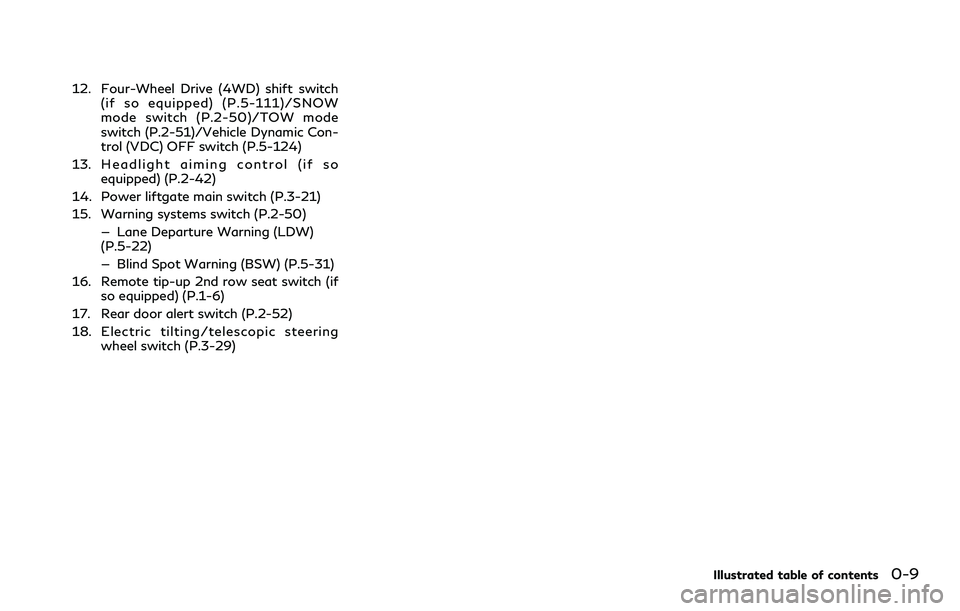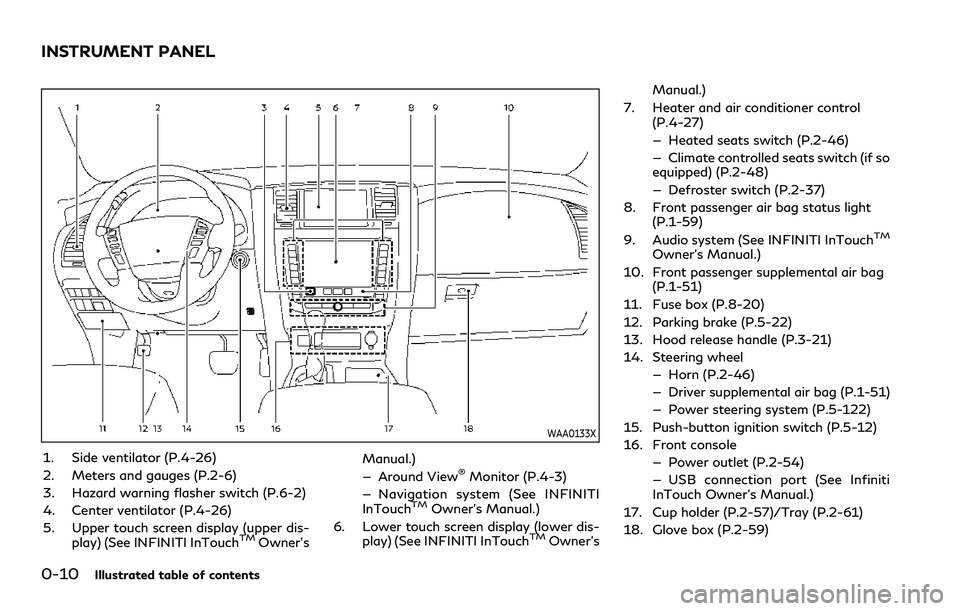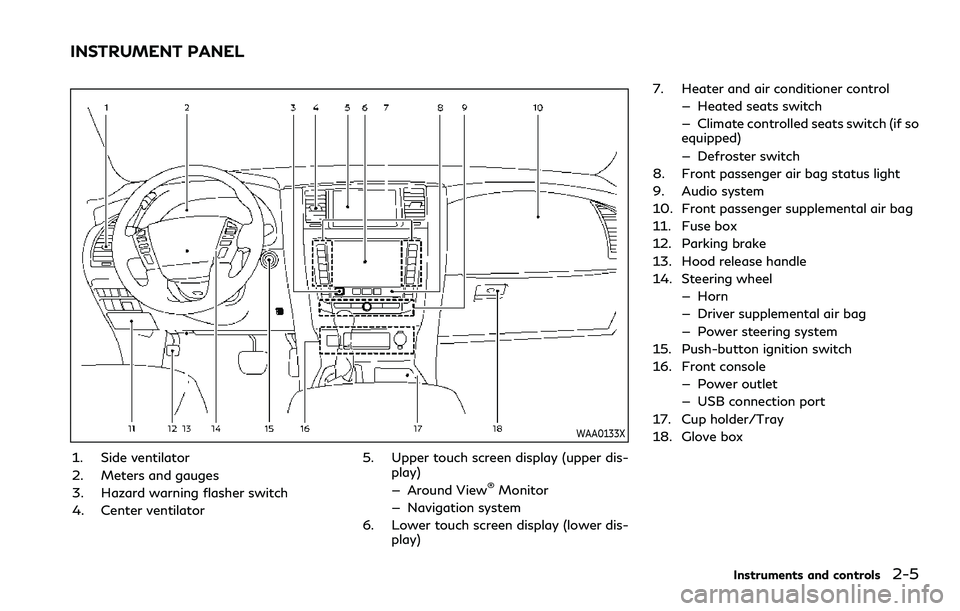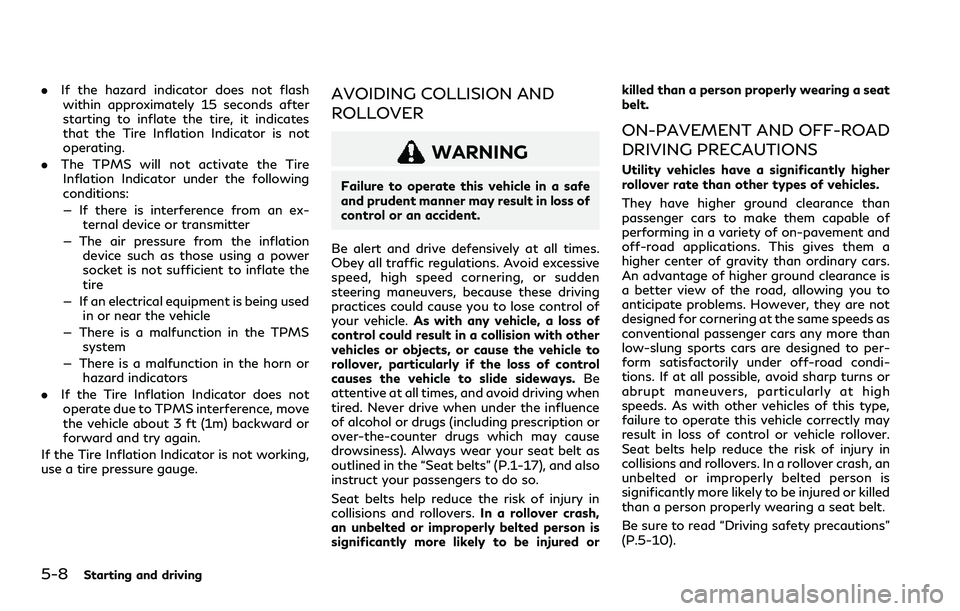power steering INFINITI QX80 2020 Owner's Manual
[x] Cancel search | Manufacturer: INFINITI, Model Year: 2020, Model line: QX80, Model: INFINITI QX80 2020Pages: 516, PDF Size: 1.89 MB
Page 16 of 516

0-8Illustrated table of contents
WAA0132X
1. Power liftgate switch (if so equipped)(P.3-21)
2. Heated steering wheel switch (P.2-45)
3. Instrument brightness control switch (P.2-44) 4. TRIP/RESET switch for twin trip od-
ometer (P.2-7)
5. Headlight, fog light and turn signal switch
— Headlight (P.2-38)
— Turn signal (P.2-44) — Fog light (P.2-45)
6. Steering-wheel-mounted controls (left side)
— Audio control steering switch (See
INFINITI InTouch
TMOwner’s Manual.)
— Hands-Free Phone System switch
(See INFINITI InTouch
TMOwner’s
Manual.)
— Trip computer switch (P.2-29)
7. Wiper and washer switch (P.2-34)
8. Steering-wheel-mounted controls (right side)
— Cruise control system (if so
equipped) (P.5-60)
— Intelligent Cruise Control (ICC) sys-
tem (if so equipped) (P.5-62)
9. Dynamic driver assistance switch (if so equipped)
— Lane Departure Prevention (LDP)
system (if so equipped) (P.5-22)
— Distance Control Assist (DCA) sys-
tem (if so equipped) (P.5-82)
— Blind Spot Intervention
®(BSI) sys-
tem (if so equipped) (P.5-40)
10. Shift lever (P.5-17)
11. INFINITI controller (See INFINITI In- Touch
TMOwner’s Manual.)
COCKPIT
Page 17 of 516

12. Four-Wheel Drive (4WD) shift switch(if so equipped) (P.5-111)/SNOW
mode switch (P.2-50)/TOW mode
switch (P.2-51)/Vehicle Dynamic Con-
trol (VDC) OFF switch (P.5-124)
13. Headlight aiming control (if so equipped) (P.2-42)
14. Power liftgate main switch (P.3-21)
15. Warning systems switch (P.2-50) — Lane Departure Warning (LDW)
(P.5-22)
— Blind Spot Warning (BSW) (P.5-31)
16. Remote tip-up 2nd row seat switch (if so equipped) (P.1-6)
17. Rear door alert switch (P.2-52)
18. Electric tilting/telescopic steering wheel switch (P.3-29)
Illustrated table of contents0-9
Page 18 of 516

0-10Illustrated table of contents
WAA0133X
1. Side ventilator (P.4-26)
2. Meters and gauges (P.2-6)
3. Hazard warning flasher switch (P.6-2)
4. Center ventilator (P.4-26)
5. Upper touch screen display (upper dis-play) (See INFINITI InTouch
TMOwner’s Manual.)
— Around View
®Monitor (P.4-3)
— Navigation system (See INFINITI
InTouch
TMOwner’s Manual.)
6. Lower touch screen display (lower dis- play) (See INFINITI InTouch
TMOwner’s Manual.)
7. Heater and air conditioner control (P.4-27)
— Heated seats switch (P.2-46)
— Climate controlled seats switch (if so
equipped) (P.2-48)
— Defroster switch (P.2-37)
8. Front passenger air bag status light (P.1-59)
9. Audio system (See INFINITI InTouch
TM
Owner’s Manual.)
10. Front passenger supplemental air bag (P.1-51)
11. Fuse box (P.8-20)
12. Parking brake (P.5-22)
13. Hood release handle (P.3-21)
14. Steering wheel — Horn (P.2-46)
— Driver supplemental air bag (P.1-51)
— Power steering system (P.5-122)
15. Push-button ignition switch (P.5-12)
16. Front console — Power outlet (P.2-54)
— USB connection port (See Infiniti
InTouch Owner’s Manual.)
17. Cup holder (P.2-57)/Tray (P.2-61)
18. Glove box (P.2-59)
INSTRUMENT PANEL
Page 20 of 516

0-12Illustrated table of contents
WAA0134X
VK56VD ENGINE
1. Window washer fluid reservoir(P.8-10)
2. Fuse/fusible link holder (P.8-18)
3. Engine oil dipstick (P.8-6)
4. Power steering fluid reservoir (P.8-8) 5. Engine oil filler cap (P.8-6)
6. Brake fluid reservoir (P.8-9)
7. Fuse/fusible link holder (P.8-18)
8. Battery (P.8-11)
9. Radiator filler cap (P.8-4)
10. Engine coolant reservoir (P.8-4)11. Drive belts (P.8-13)
12. Air cleaner (P.8-14)
ENGINE COMPARTMENT
Page 95 of 516

WAA0132X
1. Power liftgate switch (if so equipped)
2. Heated steering wheel switch
3. Instrument brightness control switch
4. TRIP/RESET switch for twin trip od-ometer 5. Headlight, fog light and turn signal
switch
— Headlight
— Turn signal
— Fog light 6. Steering-wheel-mounted controls (left
side)
— Audio control steering switch
— Hands-Free Phone System switch
— Trip computer switch
7. Wiper and washer switch
8. Steering-wheel-mounted controls (right side)
— Cruise control system (if so
equipped)
— Intelligent Cruise Control (ICC) sys-
tem (if so equipped)
9. Dynamic driver assistance switch (if so equipped)
— Lane Departure Prevention (LDP)
system (if so equipped)
— Distance Control Assist (DCA) sys-
tem (if so equipped)
— Blind Spot Intervention
®(BSI) sys-
tem (if so equipped)
10. Shift lever
11. INFINITI controller
12. Four-Wheel Drive (4WD) shift switch (if so equipped)/SNOW mode switch/
TOW mode switch/Vehicle Dynamic
Control (VDC) OFF switch
13. Headlight aiming control (if so equipped)
14. Power liftgate main switch
Instruments and controls2-3
COCKPIT
Page 97 of 516

WAA0133X
1. Side ventilator
2. Meters and gauges
3. Hazard warning flasher switch
4. Center ventilator5. Upper touch screen display (upper dis-
play)
— Around View
®Monitor
— Navigation system
6. Lower touch screen display (lower dis- play) 7. Heater and air conditioner control
— Heated seats switch
— Climate controlled seats switch (if so
equipped)
— Defroster switch
8. Front passenger air bag status light
9. Audio system
10. Front passenger supplemental air bag
11. Fuse box
12. Parking brake
13. Hood release handle
14. Steering wheel — Horn
— Driver supplemental air bag
— Power steering system
15. Push-button ignition switch
16. Front console — Power outlet
— USB connection port
17. Cup holder/Tray
18. Glove box
Instruments and controls2-5
INSTRUMENT PANEL
Page 175 of 516

3 Pre-driving checks and adjustments
Keys ........................................................................\
.............. 3-2Intelligent Key .............................................................. 3-2
Valet hand-off ............................................................. 3-4
Doors ........................................................................\
............ 3-4 Locking with mechanical key ................................... 3-4
Opening and closing windows with the
mechanical key ............................................................. 3-5
Locking with inside lock knob ................................. 3-5
Locking with power door lock switch ................... 3-5
Automatic door locks ................................................. 3-6
Child safety rear door lock ...................................... 3-6
Intelligent Key system ...................................................... 3-7 Intelligent Key operating range ............................... 3-9
Door locks/unlocks precaution ............................... 3-9
Intelligent Key operation ......................................... 3-10
Battery saver system ............................................... 3-12
Warning signals ......................................................... 3-12
Troubleshooting guide ............................................. 3-13
Remote keyless entry system ...................................... 3-15 How to use remote keyless entry system .......... 3-16
Remote engine start (if so equipped) ........................ 3-18 Remote engine start operating range ................. 3-19
Remote starting the engine ................................... 3-19
Extending engine run time ...................................... 3-19 Canceling a remote engine start ......................... 3-19
Conditions the remote engine start will
not work ................................................................... 3-20
Hood ........................................................................\
.......... 3-21
Liftgate ........................................................................\
..... 3-21 Operating manual liftgate .................................... 3-22
Operating power liftgate ...................................... 3-22
Auto closure ............................................................ 3-25
Liftgate release lever ............................................. 3-26
Fuel-filler door ................................................................ 3-26
Opening the fuel-filler door ................................. 3-26
Fuel-filler cap ........................................................... 3-27
Tilt/telescopic steering ................................................. 3-29
Electric operation .................................................... 3-29
Sun visors ........................................................................\
. 3-29
Mirrors ........................................................................\
..... 3-30
Inside mirror ............................................................. 3-30
Outside mirrors ........................................................ 3-36
Vanity mirror ............................................................ 3-38
Automatic drive positioner .......................................... 3-39
Entry/exit function ................................................. 3-39
Memory storage ...................................................... 3-39
Setting memory function ..................................... 3-40
System operation .................................................... 3-41
Page 215 of 516

SYSTEM OPERATION
The automatic drive positioner system will
not work or will stop operating under the
following conditions:
.When the vehicle speed is above 0 MPH
(0 km/h) or 4 MPH (7 km/h) for some
limited functions such linking an Intelli-
gent Key to the vehicle when the power
source is turned on from off or during the
Exit function.
. When any of the memory switches are
pushed while the automatic drive posi-
tioner is operating.
. When the adjusting switch for the dri-
ver’s seat and steering column is turned
on while the automatic drive positioner is
operating.
. When the seat has already been moved
to the memorized position.
. When no seat position is stored in the
memory switch.
. When the shift lever is moved from the P
(Park) position to any other position.
Pre-driving checks and adjustments3-41
Page 257 of 516

4WD shift switch .................................................... 5-116
4WD shift indicator ................................................ 5-117
4WD warning light ................................................. 5-117
Hill Start Assist system ............................................... 5-119
Parking/parking on hills ............................................. 5-120
TOW mode ..................................................................... 5-121
SNOW mode .................................................................. 5-121
Power steering .............................................................. 5-122
Brake system .................................................................. 5-122 Braking precautions ................................................ 5-122
Parking brake break-in .......................................... 5-122
Brake assist .................................................................... 5-123 Brake assist ............................................................... 5-123
Anti-lock Braking System (ABS) ......................... 5-123 Vehicle Dynamic Control (VDC) system ............... 5-124
Vehicle Dynamic Control (VDC)
OFF switch ............................................................. 5-126
Cold weather driving ................................................... 5-127
Freeing a frozen door lock ................................. 5-127
Antifreeze ................................................................ 5-127
Battery ..................................................................... 5-127
Draining of coolant water .................................. 5-127
Tire equipment ....................................................... 5-127
Special winter equipment ................................... 5-127
Driving on snow or ice ......................................... 5-127
Engine block heater (if so equipped) .............. 5-128
Page 262 of 516

5-8Starting and driving
.If the hazard indicator does not flash
within approximately 15 seconds after
starting to inflate the tire, it indicates
that the Tire Inflation Indicator is not
operating.
. The TPMS will not activate the Tire
Inflation Indicator under the following
conditions:
— If there is interference from an ex- ternal device or transmitter
— The air pressure from the inflation device such as those using a power
socket is not sufficient to inflate the
tire
— If an electrical equipment is being used in or near the vehicle
— There is a malfunction in the TPMS system
— There is a malfunction in the horn or hazard indicators
. If the Tire Inflation Indicator does not
operate due to TPMS interference, move
the vehicle about 3 ft (1m) backward or
forward and try again.
If the Tire Inflation Indicator is not working,
use a tire pressure gauge.AVOIDING COLLISION AND
ROLLOVER
WARNING
Failure to operate this vehicle in a safe
and prudent manner may result in loss of
control or an accident.
Be alert and drive defensively at all times.
Obey all traffic regulations. Avoid excessive
speed, high speed cornering, or sudden
steering maneuvers, because these driving
practices could cause you to lose control of
your vehicle. As with any vehicle, a loss of
control could result in a collision with other
vehicles or objects, or cause the vehicle to
rollover, particularly if the loss of control
causes the vehicle to slide sideways. Be
attentive at all times, and avoid driving when
tired. Never drive when under the influence
of alcohol or drugs (including prescription or
over-the-counter drugs which may cause
drowsiness). Always wear your seat belt as
outlined in the “Seat belts” (P.1-17), and also
instruct your passengers to do so.
Seat belts help reduce the risk of injury in
collisions and rollovers. In a rollover crash,
an unbelted or improperly belted person is
significantly more likely to be injured or killed than a person properly wearing a seat
belt.
ON-PAVEMENT AND OFF-ROAD
DRIVING PRECAUTIONS
Utility vehicles have a significantly higher
rollover rate than other types of vehicles.
They have higher ground clearance than
passenger cars to make them capable of
performing in a variety of on-pavement and
off-road applications. This gives them a
higher center of gravity than ordinary cars.
An advantage of higher ground clearance is
a better view of the road, allowing you to
anticipate problems. However, they are not
designed for cornering at the same speeds as
conventional passenger cars any more than
low-slung sports cars are designed to per-
form satisfactorily under off-road condi-
tions. If at all possible, avoid sharp turns or
abrupt maneuvers, particularly at high
speeds. As with other vehicles of this type,
failure to operate this vehicle correctly may
result in loss of control or vehicle rollover.
Seat belts help reduce the risk of injury in
collisions and rollovers. In a rollover crash, an
unbelted or improperly belted person is
significantly more likely to be injured or killed
than a person properly wearing a seat belt.
Be sure to read “Driving safety precautions”
(P.5-10).